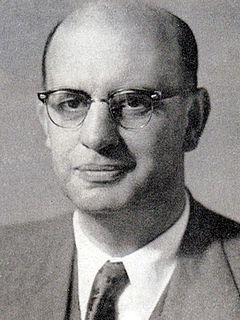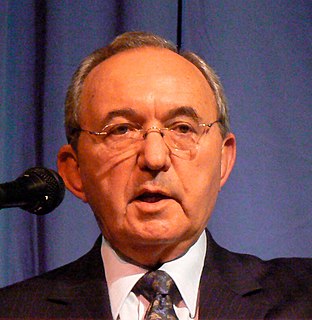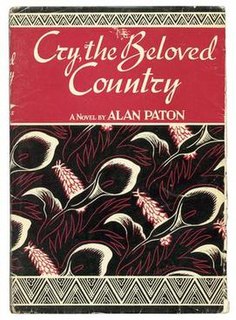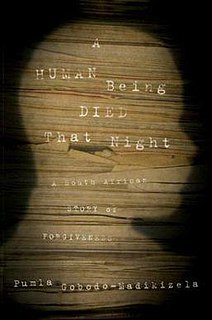
Winnie Madikizela-Mandela, also known as Winnie Mandela, was a South African anti-apartheid activist and politician, and the ex-wife of Nelson Mandela. She served as a Member of Parliament from 1994 to 2003, and from 2009 until her death, and was a deputy minister of arts and culture from 1994 to 1996. A member of the African National Congress (ANC) political party, she served on the ANC's National Executive Committee and headed its Women's League. Madikizela-Mandela was known to her supporters as the "Mother of the Nation".

The Sharpeville massacre was an event which occurred on 21 March 1960, at the police station in the South African township of Sharpeville in Transvaal.

Pieter Willem Botha,, commonly known as "P. W." and Die Groot Krokodil, was the leader of South Africa from 1978 to 1989, serving as the last Prime Minister from 1978 to 1984 and the first executive State President from 1984 to 1989.

Robert Mangaliso Sobukwe was a prominent South African political dissident, who founded the Pan Africanist Congress in opposition to the South African apartheid system. In 2004, Sobukwe was voted 42nd in the SABC3's Great South Africans.

Richard Joseph Goldstone is a South African former judge. After working for 17 years as a commercial lawyer, he was appointed by the South African government to serve on the Transvaal Supreme Court from 1980 to 1989 and the Appellate Division of the Supreme Court of South Africa from 1990 to 1994.
The International Day for the Elimination of Racial Discrimination is observed annually on 21 March. On that day, in 1960, police opened fire and killed 69 people at a peaceful demonstration in Sharpeville, South Africa, against the apartheid pass laws. Proclaiming the day in 1966, the United Nations General Assembly called on the international community to redouble its efforts to eliminate all forms of racial discrimination.
The Jazz Epistles were South Africa's first important bebop band. Inspired by Art Blakey's Jazz Messengers, its members included Dollar Brand on piano, Kippie Moeketsi on alto saxophone, Jonas Gwangwa on trombone, Hugh Masekela on trumpet, Johnny Gertze on bass, and Early Mabuza or Makaya Ntshoko on drums. The group became famous after performing in the jam sessions called Jazz at the Odin in the Odin Theater in Sophiatown.

Cry, the Beloved Country is a novel by Alan Paton, published in 1948. American publisher Bennett Cerf remarked at that year's meeting of the American Booksellers Association that there had been "only three novels published since the first of the year that were worth reading… Cry, The Beloved Country, The Ides of March, and The Naked and the Dead."

Apartheid was a system of institutionalised racial segregation that existed in South Africa from 1948 until the early 1990s. Apartheid was characterised by an authoritarian political culture based on baasskap, which encouraged state repression of Black African, Coloured, and Asian South Africans for the benefit of the nation's minority white population. The economic legacy and social effects of apartheid continue to the present day.
Christopher John Robert Dugard, known as John Dugard, is a South African professor of international law. His main academic specializations are in Roman-Dutch law, public international law, jurisprudence, human rights, criminal procedure and international criminal law. He has served on the International Law Commission, the primary UN institution for the development of international law, and has been active in reporting on human-rights violations by Israel in the Palestinian territories.
The Rand Daily Mail was a South African newspaper published from 1902 until it was controversially closed in 1985 after adopting an outspoken anti-apartheid stance in the midst of a massive clampdown on activists by the security forces. The title was based in Johannesburg as a daily newspaper and best known for breaking the news about the apartheid state's Muldergate Scandal in 1979. It also exposed the truth about the death in custody of anti-apartheid activist Steve Biko, in 1977.
Peter Magubane is a South African photographer.
Alfred Khumalo , better known as Alf Kumalo, and with the surname sometimes spelled Khumalo, was a South African documentary photographer and photojournalist.

A Human Being Died That Night is a 2003 book by Pumla Gobodo-Madikizela.
The Story I Am About to Tell was a successful South African play by Duma Kumalo. Produced by a support group for survivors giving testimony at the Truth and Reconciliation Commission, and starring three of them, it ran for five years both at home and abroad.
Have You Heard from Johannesburg is a series of seven documentary films, with a total runtime of 8.5 hours, covering the 45-year struggle of the global anti-apartheid movement against South Africa's apartheid system and its international supporters who considered them an ally in the Cold War. The combined films have an epic scope, spanning most of the globe over half a century. Beginning with the very first session of the United Nations, and ending in 1990 – when, after 27 years in prison, Nelson Mandela, the best known leader of the African National Congress toured the world, a free man. Produced and directed by Connie Field, it includes other events such as the Sharpeville massacre, the Soweto uprising, the murder of Steve Biko, and covers the role of some people less well known outside South Africa than Nelson Mandela, such as African National Congress leader Oliver Tambo. The title comes from the lyrics of the Gil Scott-Heron song "Johannesburg".

On 21 March 1985, on the 25th anniversary of the Sharpeville massacre, members of the South African Police opened fire on a crowd of people gathered on Maduna Road between Uitenhage and Langa township in the Eastern Cape, South Africa. The crowd had been attending a funeral of one the six who had been slain by the apartheid police on 17 March 1985. They had gathered at Maduna Square and were heading towards the house where the funeral was held when the police blocked the road with two armoured vehicles and ordered the crowd to disperse. When the crowd failed to comply immediately, police opened fire on the crowd, killing 35 people and leaving 27 wounded. The incident became known as the Uitenhage/Langa massacre.









